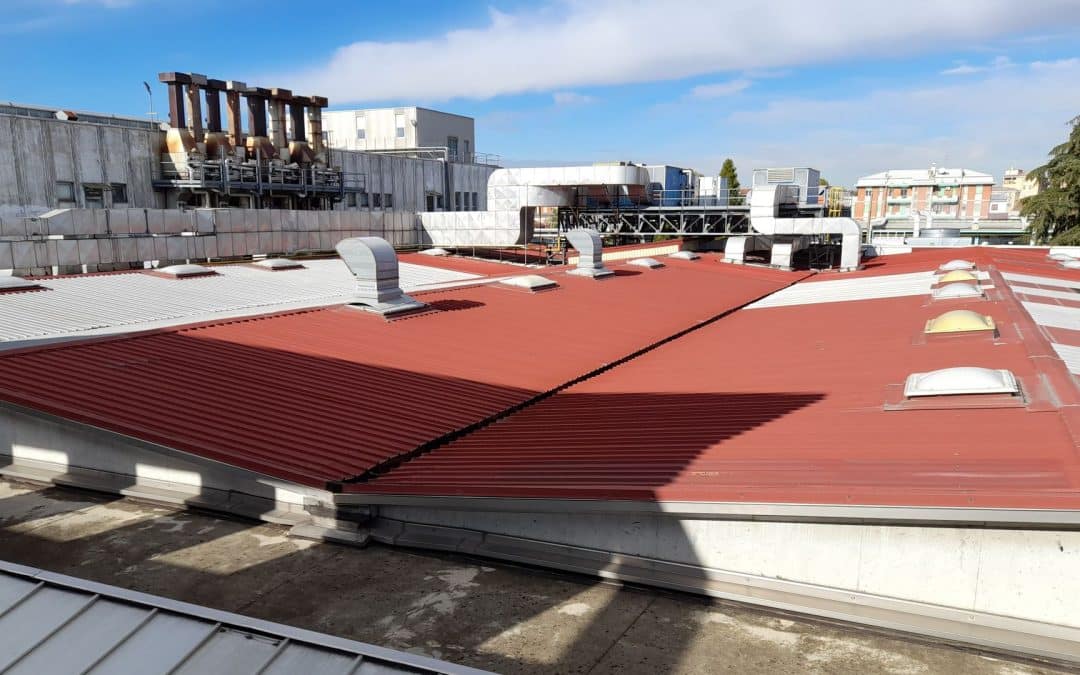Maintaining the roof of your commercial building is crucial for protecting your investment and ensuring a safe working environment. A strong, reliable roof shields your property from the elements and helps maintain structural integrity. However, over time, even the best roofs can experience wear and tear that necessitates repair or replacement.
Deciding whether to repair or replace your commercial roof can be challenging. Various factors need to be considered, such as the extent of the damage, the cost involved, and the long-term benefits of each option. Making an informed decision can save you money and prevent future headaches.
In this article, we’ll discuss key signs that indicate your commercial roof needs attention. We’ll also explore factors to consider when deciding whether to repair or replace, analyze the costs associated with each option, and understand the long-term implications of both choices. This information will help you make the best decision for your commercial property.
Signs Your Commercial Roof Needs Attention
Identifying early signs that your commercial roof needs attention can prevent small issues from turning into costly problems. Look out for the following indicators that your roof may require repair or replacement.
1. Leaks and Water Damage: Persistent leaks or visible water damage inside your building are clear signs that your roof is compromised. Water stains on ceilings and walls, mold growth, and drips are indicators that moisture has penetrated the roofing system. Promptly addressing these issues can prevent structural damage and health hazards.
2. Visible Wear and Tear: Regularly inspect your roof for signs of wear and tear, such as cracked, warped, or missing shingles. Flat roofs may develop blisters, ridges, or punctures. These signs suggest that the roofing material has deteriorated and may no longer provide adequate protection.
3. Sagging Roof Deck: A sagging roof deck indicates structural issues that require immediate attention. This problem can arise from prolonged exposure to moisture, poor installation, or excessive load on the roof. If you notice any sagging, consult a professional roofer to assess the extent of the damage.
4. High Energy Bills: A damaged roof can lead to increased energy bills. If your HVAC system is working harder to maintain a consistent indoor temperature, your roof’s insulation may be compromised. Addressing the issue can improve energy efficiency and reduce costs.
5. Age of the Roof: The age of your roof is a significant factor in determining whether it needs attention. Most commercial roofs have a lifespan of 20 to 30 years, depending on the materials used. If your roof is approaching or exceeding this age, it’s time to consider an inspection and potential replacement.
Factors to Consider When Deciding to Repair or Replace
Deciding whether to repair or replace your commercial roof requires careful consideration of several factors. Here are key points to help guide your decision.
1. Extent of Damage: Assess the extent of the damage to your roof. For minor issues like small leaks or localized areas of wear and tear, repairs may be sufficient. However, if the damage is widespread or affects the structural integrity of the roof, replacement might be the better option.
2. Cost-Effectiveness: Evaluate the cost-effectiveness of repairs versus replacement. While repairs are typically less expensive upfront, repeated repairs can add up over time. If your roof frequently requires maintenance, investing in a replacement may offer long-term savings.
3. Roof’s Age and Lifespan: Consider the age of your roof and its expected lifespan. If your roof is nearing the end of its life expectancy, replacement is likely a more cost-effective choice. Installing a new roof eliminates the need for ongoing repairs and provides better protection.
4. Impact on Business Operations: Determine how roof repairs or replacement will impact your business operations. Repairs can often be completed quickly with minimal disruption, whereas replacement might require more time and could temporarily affect your business activities. Plan accordingly to minimize downtime.
5. Energy Efficiency and Insulation: Evaluate the energy efficiency of your current roof. If your roof’s insulation is compromised, replacing it with modern materials can improve insulation, reduce energy bills, and enhance indoor comfort. A new roof can also incorporate energy-efficient features that align with your building’s sustainability goals.
6. Future Maintenance: Consider the future maintenance requirements of your roof. Repairs may address current issues but not prevent future problems. A new roof reduces the likelihood of frequent maintenance and provides peace of mind for years to come.
By weighing these factors, you can make an informed decision about whether to repair or replace your commercial roof, ensuring it meets your building’s needs and budget.
Cost Analysis: Repairing vs. Replacing Your Roof
When analyzing the costs involved in repairing versus replacing your commercial roof, we need to look at both immediate and long-term expenses. Repairing your roof is typically less expensive in the short term. Minor repairs can fix issues like small leaks or damaged sections, allowing you to manage costs more effectively and quickly return your building to optimal condition.
However, the expenses associated with repeated repairs can add up. If we consistently patch up problem areas without addressing underlying issues, the cumulative cost can exceed that of a complete roof replacement. Additionally, frequent repair needs can cause operational disruption, affecting the day-to-day business activities.
On the other hand, replacing your roof has a higher initial cost but provides a fresh start with new materials that offer better durability and performance. While the upfront investment is significant, a new roof reduces the likelihood of frequent repairs, translating to lower maintenance costs over time. It also improves energy efficiency, potentially lowering utility bills.
It’s essential to weigh these costs against your budget and long-term goals. If your roof needs constant maintenance or long-term reliability is a priority, replacing the roof might be the more economical choice in the grand scheme of things.
Long-term Implications of Repairing and Replacing
Understanding the long-term implications of repairing versus replacing your commercial roof is crucial for making an informed decision. Opting for repairs might seem cost-effective initially, but it may not address deeper structural issues that could worsen over time. Short-term fixes can keep the roof functional but may also lead to more extensive damage, requiring significant repairs or even premature replacement down the line.
Conversely, investing in a roof replacement offers long-term benefits. Modern roofing materials tend to provide better resilience against harsh weather conditions and improved energy efficiency. A new roof comes with warranties that offer peace of mind, ensuring that any potential issues arising within the warranty period are covered.
From an energy efficiency standpoint, new roofing materials often come with advanced features like better insulation and reflective surfaces. This can contribute to lower energy consumption for heating and cooling, benefitting both your bottom line and the environment.
Future-proofing your building is another consideration. A new roof can better accommodate any potential future building modifications or additions. It aligns better with modern building codes and standards, potentially increasing the property’s value should you decide to sell.
Conclusion
Deciding when to repair or replace your commercial roof is a significant decision with lasting effects. We must consider the extent of the damage, cost-effectiveness, impact on business operations, energy efficiency, and future maintenance needs. Repairs may solve immediate issues at a lower cost but may not provide a long-lasting solution. On the other hand, a full roof replacement involves a higher initial investment but offers long-term benefits, including better energy efficiency, reduced maintenance, and increased property value.
At Mike Huddleston Roofing Systems, we specialize in providing comprehensive commercial roofing services tailored to your specific needs. Our experienced professionals can help you assess your roof’s condition and guide you in making the best decision for your business. If you’re ready to discuss your commercial roofing needs, contact us today for a consultation. Ensure your commercial property remains secure and efficient for years to come with the right choice in roofing.

